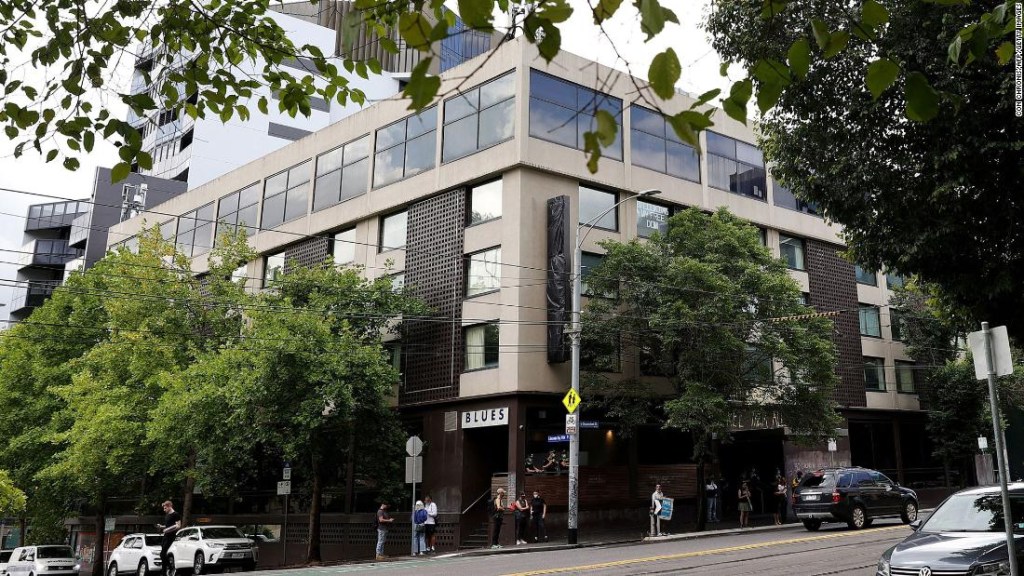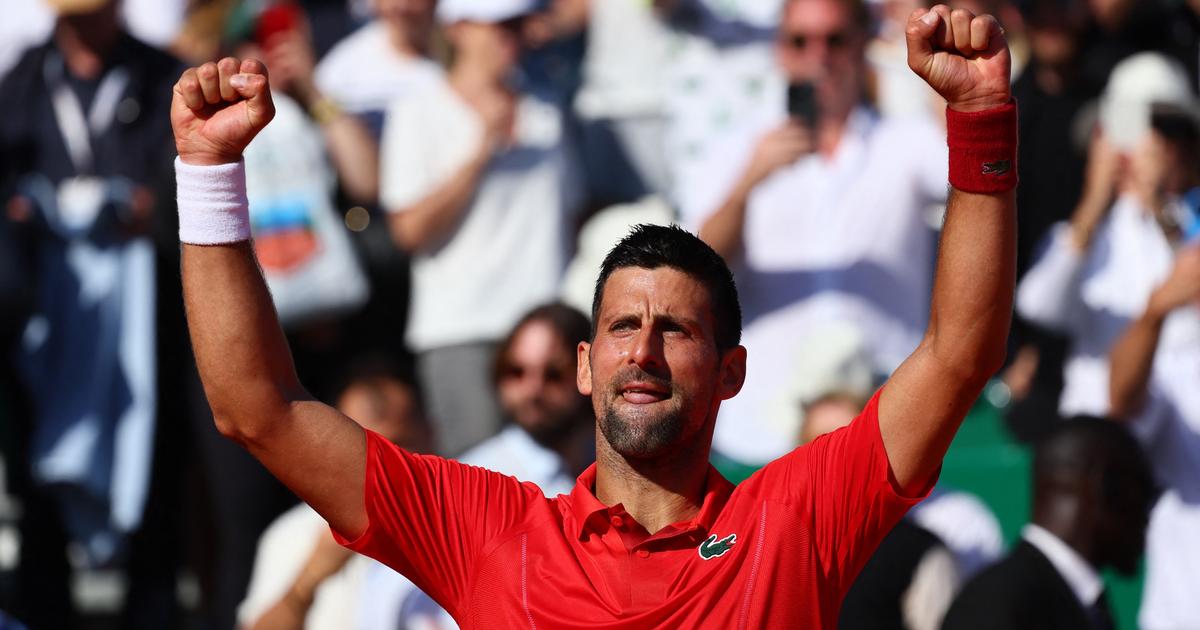The retention of Novak Djokovic shows refugee crisis in Australia 3:51
(CNN) -
For months, activists have gathered outside a dilapidated hotel in central Melbourne, calling for the release of the dozens of refugees held inside.
But on Friday, a different group of protesters had an unusual detainee in their sights: World No. 1 tennis player Novak Djokovic, who is confined to the hotel as he presents a legal challenge to the revocation of his visa ahead of the Australian Open. .
"Free Novac [sic]," read the handwritten sign of a protester taped to a tennis racket.
"Let Novac play."
The Novak Djokovic case in Australia: how did we get to this controversy?
Australian Open organizers said Tuesday that Djokovic, who previously criticized COVID-19 vaccination mandates, was granted a "medical exemption" from the requirement that international travelers must be fully vaccinated to enter the country.
But Djokovic arrived in Australia this week and found that his visa had been revoked.
Prime Minister Scott Morrison said the 34-year-old Serb "did not have a valid medical exemption."
advertising
Tennis Australia was informed in a November 2021 letter that players not vaccinated with a recent covid-19 infection would not be able to enter the country under public health guidelines, Morrison told reporters on Thursday.
Djokovic's legal team obtained an urgent court order against the decision, but it is not yet clear whether the reigning Australian Open men's individual champion will be able to compete in the tournament, which begins on January 17.
Court documents released Saturday by the Australian Federal Circuit show that Djokovic was granted a medical exemption to compete after testing positive for COVID-19 in December.
His attorneys are appealing the visa cancellation and declined to comment before his court hearing on Monday.
People hold banners outside the Park Hotel where 20-time Grand Slam champion Novak Djokovic is staying in Melbourne, Australia.
The Djokovic case has gone far beyond a visa issue.
It has drawn ire from people who feel that the rich and powerful do not suffer the same hardships when it comes to the tough rules against Covid-19 in Australia, which have separated families.
However, it also enraged anti-vaccines who believe coronavirus restrictions hurt their civil liberties and has raised concerns among Australia's Serb community, some of whom say Djokovic is being unfairly targeted.
Nick Kyrgios criticizes "very bad" treatment of Novak Djokovic amid visa dispute
But Djokovic's situation has also highlighted the plight of asylum seekers in Australia.
While the tennis star will eventually be allowed to play in the tournament or be forced to leave the country, other detainees at the same facility have been locked up for years and face indefinite detention under Australia's strict immigration rules.
Widespread outrage
As dozens of protesters from disparate groups across the political spectrum gathered in front of the Park Hotel on Friday, there was something that united them: the drive for freedom.
Some were from Serbian cultural groups, singing and waving the flag of the Balkan country, who saw Djokovic's arrest as a great injustice against one of the world's biggest sports stars.
"I don't see why he should be trapped in a detention center," said Tara, a 17-year-old Australian-Serbian tennis player who did not give her last name.
"Everyone has their own freedom of choice, whether they are vaccinated or not."
Djokovic, who is tied with Roger Federer and Rafael Nadal for a record 20 men's Grand Slam singles titles, has not publicly disclosed his vaccination status, but expressed opposition to covid-19 vaccines and vaccination mandates in April 2020.
A general view of the government detention center, the Park Hotel.
Others used Djokovic's plight as an opportunity to criticize how vaccination mandates had restricted civil liberties.
One woman - who for privacy reasons identified herself only as Matty - said that if Djokovic goes home, he will not see the Australian Open.
"I used to go every year, I can't this year because of vaccination mandates," said Matty, adding that she is not vaccinated.
Another masked person, who declined to speak to CNN, was holding a sign declaring Djokovic "hostage to the communist state."
Nick Kyrgios criticizes "very bad" treatment of Novak Djokovic amid visa dispute
But others turned their attention to the roughly 30 refugees held at the hotel.
Formerly used by the Australian government as a COVID-19 quarantine facility, the hotel has been an Alternative Place of Detention (APOD) for refugees and asylum seekers for at least a year.
Nearly a decade ago Australia said that no asylum seekers arriving by boat would be settled in the country.
Hundreds were housed in offshore processing centers over the years, although some were sent to hotels in Australia to receive treatment for health problems.
Refugees still have little hope of freedom, and the conditions in which they are held are highly controversial.
Standing in front of the Park Hotel, which is marked with the words "free them," Tom Hardman, a 27-year-old teacher, said he had come out in support of the refugees.
"I am here because the loneliness and pain these men suffer from not knowing when they will be released is unbearable to witness," he said.
The police stand guard at the government detention center.
Oscar Sterner, 25, said he was opposed to both anti-vaccines and the way refugees are being held, saying the real problem was putting an unvaccinated visitor in a hotel with refugees requiring medical attention. .
"Djokovic is a millionaire bastard who has rightly drawn the ire of a lot of people in Australia," he said.
"You can't be bothered to get vaccinated to protect the people around you."
As it is inside
Djokovic's supporters criticized his treatment, with the tennis star's mother saying her son is being "treated like a prisoner."
"It is so dirty and the food is so terrible," Dijana Djokovic told reporters Thursday at a press conference in the Serbian capital Belgrade.
"It's just not fair. It's not human."
American tennis star John Isner also tweeted in support of Djokovic, saying that keeping him at the hotel was "not right."
"There is no justification for the treatment he is receiving. He followed the rules, was allowed into Australia and is now being detained against his own will. It is a disgrace."
Australian Home Secretary Karen Andrews said on Friday that Djokovic "is not a captive" and that he can leave the country at any time.
"He is free to go any time he chooses and Border Force will facilitate that," Andrews told public broadcaster ABC.
"It is the responsibility of the individual traveler to ensure that they have all the necessary documentation to enter Australia."
Australian immigration laws allow a ban on re-entry into the country for up to three years after the cancellation of a visa under certain conditions, but it is unclear whether Djokovic will face such a penalty.
In a statement released on Friday, the Association of Professional Tennis Players said that Djokovic had verified his well-being.
"With the utmost respect for all personal views on vaccinations, vaccinated athletes and unvaccinated athletes (with an approved medical exemption) should have the freedom to compete," said the association, which was co-founded by Djokovic.
"We will continue to support and advocate for our members and all players, in a way that is acceptable to them."
OPINION |
Novak Djokovic's saga reveals deep divisions in Australian society
According to human rights lawyer Alison Battisson, who has four clients inside the Park Hotel, visitors without the correct visa to Australia are usually handcuffed and transported to an immigration detention center in an unmarked van with dark windows.
"It is an incredibly traumatic and dehumanizing process," he said.
Video from the Park Hotel shared with CNN shows detainees in small rooms that include a double bed, a television and some chairs.
Asylum seekers have access to a staircase that leads them to a rooftop where they can smoke.
It is not clear if Djokovic remains in the same condition.
"This is a window, we cannot open it at any time," said Adnan Choopani, one of the detainees, in a video filmed for CNN.
While the hotel appears clean and well-kept in the footage shot by Choopani, there have been reports of problems in the past.
According to Battison, there was a Covid-19 outbreak at the facility last year, with detainees reporting they found maggots in their food.
The other detainees
For the 30 or so refugees held at the hotel, the media attention on Djokovic is hard to swallow.
Many have been detained for years and have little hope of getting out.
Mehdi, who asked to use only one name to protect his family, escaped Iran when he was 15 years old and has been detained in Australia for more than eight years with limited access to education or medical care.
"I've done my time," said Mehdi, who turned 24 on Friday.
"We are suffering, we are exhausted and weary ... you are in indefinite detention, which means they can hold you for as long as they can, for as long as they want."
Cousins Adnan Choopani and Mehdi were 15 years old when they fled Iran.
Now, they are 24 years old and still in immigration detention.
Choopani said he and his fellow detainees were sitting in their rooms, many of them taking medicine for depression.
Choopani is Mehdi's cousin, and he left Iran when he was 15 years old.
He dreams of taking a walk down the street or going out for coffee.
"It's unbelievable," he said.
"I think this is just a nightmare ... we live in the 21st century, in a country that believes in democracy and continues to have this type of behavior with innocent people."
Although it is unclear if Djokovic will be allowed to play at Melbourne Park this month, the tennis star will eventually be able to leave the hotel.
Craig Foster, a former soccer player for the Australian national team who advocates for asylum seekers, says he hopes at least something good will come out of the situation.
"In a way, it is good for the world to see how Australia has treated our detainees, whether they are asylum seekers or refugees, or even an athlete like Novak who has just apparently made a mistake with their visa documentation," he noted. .
"If anything, we hope that this entire shameful saga will put Australians in a position where they better understand the plight of these people."
Who would benefit from the Djokovic situation?
1:00
Australian Open 2022Novak Djokovic



/cloudfront-eu-central-1.images.arcpublishing.com/prisa/R5YJ3MNWQRCGTFO4MKHLQKANJI.jpg)











